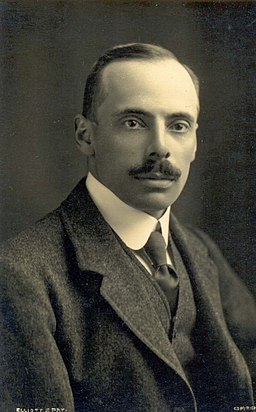The term "Received Pronunciation" (RP) was first conceived by linguist A J Ellis in 1869. It was later adopted by Daniel Jones to describe a variety of British English that was widely accepted as a standard accent for educated speakers in the UK. RP is sometimes referred to as "BBC English" or "Queen's English," although these terms are not strictly interchangeable with RP.
Daniel Jones was born in London, England, in 1881. Jones attended a private school in London before studying at the University of Cambridge, where he earned a degree in mathematics.
Jones's interest in phonetics began during his university years when he studied the phonetic system of French. After completing his degree, he went on to study linguistics and phonetics in Germany and France. He eventually became a lecturer in phonetics at University College London and later held the position of Professor of Phonetics at the same institution.
Throughout his career, Jones conducted extensive research into the sounds of various languages and developed the International Phonetic Alphabet (IPA) to represent the sounds of all languages. His work on English phonetics and phonology, including his book "An Outline of English Phonetics", was particularly influential and helped establish the study of phonetics as a distinct academic discipline.
Jones was also a proponent of the idea of a standard accent for English, which led to the development of Received Pronunciation (RP). He believed that RP was an ideal form of English that could be used as a model for language teaching and learning.
Daniel Jones believed that having a standard accent for English could promote clarity and facilitate communication between people from different regions and backgrounds. He thought that a standard accent would be particularly useful for teaching English as a second language and for facilitating international communication.
Jones was also motivated by a desire to promote social mobility and to reduce the influence of regional dialects and accents on people's opportunities in life. In his view, a standard accent could help people from diverse backgrounds to communicate on an equal footing and could facilitate social mobility by allowing people to present themselves as educated and sophisticated.
Additionally, Jones believed that a standard accent could help to preserve the purity of the English language and prevent it from being corrupted by the influence of regional dialects and foreign languages. He saw Received Pronunciation as a form of English that was free from the influence of any particular regional dialect and that represented the ideal form of the language.
Jones studied mathematics at Cambridge University before becoming interested in phonetics and pursuing a career in that field. His background in mathematics was also likely influential in his research into phonetics. As a mathematician, Jones would have been trained to think logically and to analyze complex patterns and systems. These skills would have been invaluable in his later work in phonetics, where he applied a similar analytical approach to the study of speech sounds and language patterns. Additionally, many of the principles underlying phonetics, such as the study of acoustic waveforms and the mathematical modelling of speech production and perception, are rooted in mathematics and the physical sciences. Jones' mathematical training may have given him a unique perspective on these topics and allowed him to make important contributions to the field of phonetics.
The Pronunciation of English can be downloaded from archives.org:
https://archive.org/download/pronunciationen00jonegoog/pronunciationen00jonegoog.pdf



